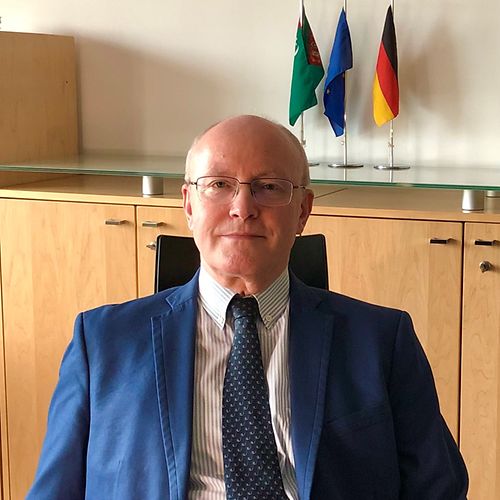Stable and growing economic cooperation forms a cornerstone of the successful relationship between Germany and Turkmenistan. Today, clear trends in bilateral economic activity are fostering optimism about future prospects. Ambassador of Germany to Turkmenistan, Bernd Heinze, highlighted this in an interview with the Turkmenistan newspaper.
Germany and Central Asia
Germany has established a leading position in its cooperation with Central Asian countries within Europ, noted Ambassador. This was evident at the inaugural meeting of regional state leaders with Federal Chancellor Olaf Scholz in Berlin last September. The meeting marked a significant step by establishing strategic cooperation between Germany and Central Asia. This is a groundbreaking format, unprecedented in the history of German relations with a specific region. It paves the way for deeper direct connections between people in the realms of economy, energy, natural resources, regional collaboration, climate, and the environment, emphasized envoy.
Economic cooperation with Turkmenistan
Ambassador Bernd Heinze noted that the strategic cooperation established between Germany and the Central Asian countries will also bolster economic ties with Turkmenistan.
A key priority for the medium term is the development and implementation of concrete joint projects. Building upon previously approved projects will also help identify future opportunities for collaboration, the Ambassador stated.
As an example, the diplomat cited the management training program that has been successfully implemented in Turkmenistan for 15 years. This program, designed to foster and support business relationships between German and Turkmen companies, will continue into the future under the new name “Business Cooperation with Germany.”
Health cooperation
The German Embassy in Ashgabat annually provides approximately 150 visas to Turkmen doctors who undergo training programs lasting 30-45 days at German medical institutions. German doctors also frequently visit Turkmenistan to conduct professional training and provide medical treatment to patients, the Ambassador said.
A notable aspect of Turkmen-German cooperation is in the field of medical technology development. A Memorandum signed in 2016 established collaboration between higher educational institutions in Turkmenistan and Germany, leading to positive outcomes. A prime example is the joint development by the Council of Young Scientists at the Institute of Telecommunications and Informatics and a group of teachers, in collaboration with German specialists, of a unique software and equipment utilizing artificial intelligence. This technology aims to create an accessible and effective medical device capable of accurately measuring pain levels in patients with mental disorders. This breakthrough has the potential to significantly enhance the quality of medical services provided to these patients. The Ambassador indicated plans to expand the application of this technology and further refine it in the near future.
The Ambassador also highlighted the planned construction of a medical cluster as part of the second phase of the city of Arkadag. This development is anticipated to attract significant interest from German companies.
Cultural and humanitarian sphere
Ambassador Heinze noted that the number of German language learners in Turkmenistan has reached 30,000, and demand continues to grow. Efforts are currently underway to expand the range of short-term language courses.
Regarding German-Turkmen academic cooperation, he mentioned that during the winter period of the 2022-2023 academic year, 127 Turkmen students had the opportunity to pursue their studies in Germany. Last year, a Memorandum of Understanding was signed between the Institute of History and Archaeology of the Academy of Sciences of Turkmenistan and the Institute of Archaeology of Germany. A similar agreement is planned to be signed between the Turkmen National Institute of World Languages named after Dovletmamed Azadi and the Martin Luther University Halle-Wittenberg.
In 2018, the Berlin Museum of Prehistory and Early History reached an agreement with the Ministry of Culture of Turkmenistan to organize a second exhibition dedicated to the cultural heritage of the Turkmen people, building on the success of the exhibition “Margiana. A Bronze Age Kingdom in Turkmenistan.”
Furthermore, the German Embassy, in collaboration with the French diplomatic mission, plans to organize a performance by the renowned German singer Katharine Mehrling in Ashgabat during the first half of the coming year.
Future plans
Discussing plans for the development of Turkmen-German relations in the coming years, the Ambassador expressed the belief that closer integration of Turkmenistan with other regional countries would be beneficial in the context of addressing various international and regional challenges.
The heads of state of Central Asia have consistently emphasized the importance of expanding regional trade, developing transport corridors, improving logistics, combating the effects of climate change, and implementing coordinated policies at their five-party summits. The Ambassador suggested that another key goal should be to enhance political and social stability through socio-economic development and encourage greater public participation in the political life of the country. Heinze expressed his support for Turkmenistan’s endeavors in these areas.
Highlighting another area of strategic cooperation between Germany and Central Asia, including Turkmenistan, the Ambassador mentioned the water sector. Given the significant impact of the climate crisis on water supply challenges in the region, the accumulated expertise of German companies in efficient water use could be valuable.
The Ambassador Bernd Heinze emphasized that both Germany and Turkmenistan recognize the need to diversify their economic strategies and reduce unilateral trade dependence. He pledged to make a substantial contribution to these efforts during his tenure. ///nCa, 6 September 2024
